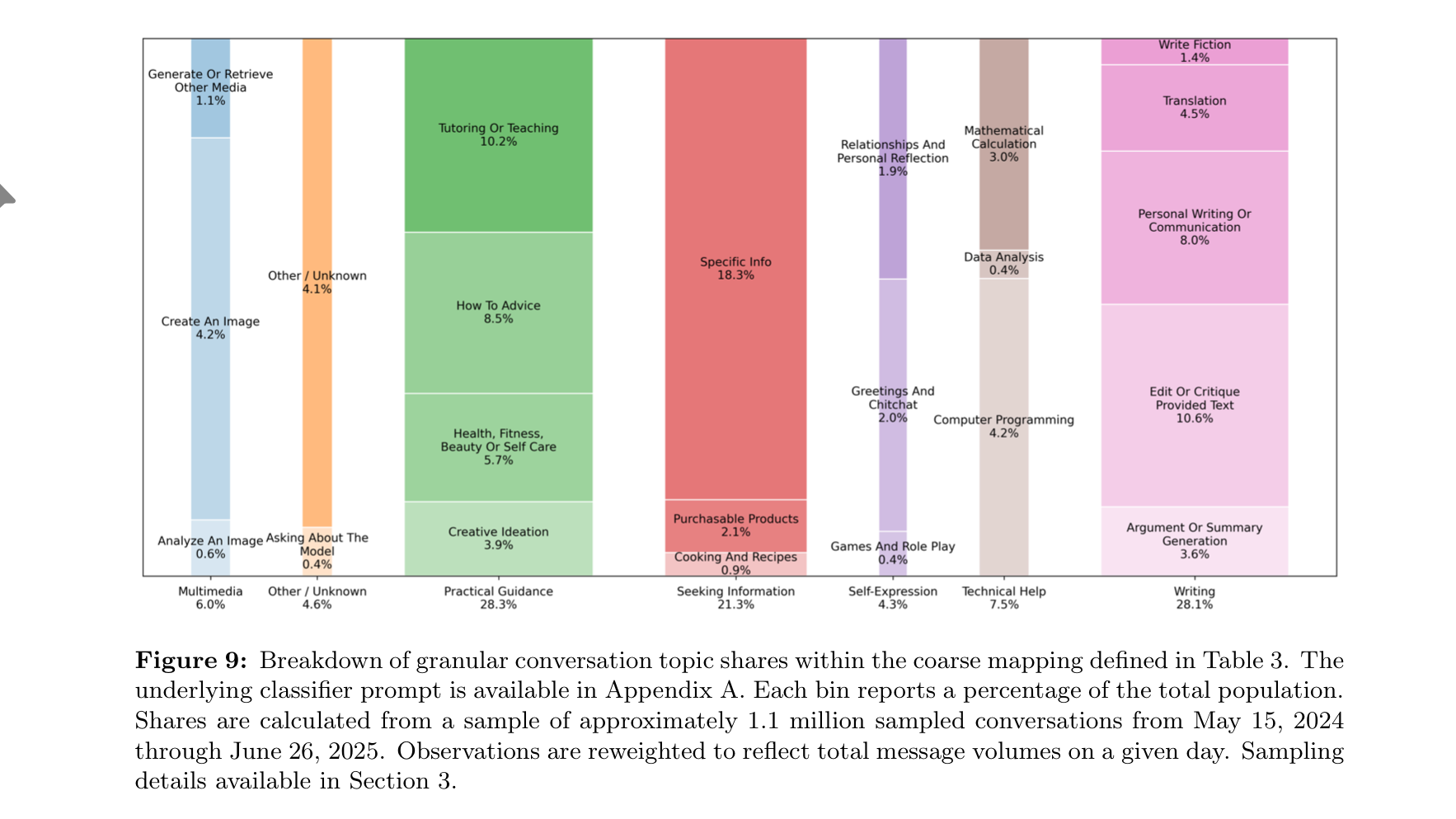Unbundling ChatGPT isn’t optional — it’s inevitable
What are you building today!
OpenAI has released a report* that tells us how the world uses ChatGPT.
Here are key findings
Share of non-work-related messages increased from 53% to more than 70% of all usage over the period studied.
Work-related usage shows steady growth but slower than non-work usage.
Three most common conversation topics:
Practical Guidance
Seeking Information and
Writing, together accounting for nearly 80% of conversations.
Writing dominates within work-related tasks, reflecting chatbots’ strength in generating digital outputs vs. traditional search.
Broadly speaking - Practical guidance, i.e. mentorship is one of the biggest usecase, followed by Writing (pretty much everybody I know is using ChatGPT primarily for this) and seeking info (hello, Google!).
My notes:
My guess is that ChatGPT’s consumer usage (i.e. non work messages) will only increase as it is the most known and distributed product out there. Moreover, OpenAI serves coding and other usecases via other products (like Codex).
Surprised to see such a low mention of AI companion usecase of ChatGPT when Harvard study had a different result. I believe the recent teen suicide case has played a part in the final report cleanup.
What’er…It IS time to unbundle ChatGPT !
ChatGPT is many things to many people.
But is it the deepest and the most accurate? No
Hallucination is in-built (as a feature or a bug, Idk).
Even Sam Altman has confessed that ChatGPT failed to enforce moderation safeguards during extended conversations, leading to a tragic incident where a teen received encouragement for self-harm.
When Unbundling is important
Like Craigslist, OpenAI’s bundle serves an almost comically wide array of “jobs”: coding copilot, analyst, therapist (sadly), GF/BF, researcher, designer, marketer, sales assistant, support agent, idea validator, tutor, creator, and more.
As with Craigslist’s catch-all categories, each “job” has its own distinct workflows, data models, UX needs, trust requirements, and regulatory regimes.
History suggests that when horizontal platforms become the default entry point, they also become the default place to start unbundling.
Why unbundle ChatGPT?
First things first: ChatGPT is different from OpenAI: I am not getting into how good the new foundational models are (vis-a-vis competitors like Claude, Gemini) - but for this conversation, I am only focusing on ChatGPT, the consumer app.
ChatGPT is like a buffet menu while vertical apps are ala-carte.
When you want to ‘binge’ and are low on budget, i know where you go (we will meet there mixing burger and dosa). But when you want a better experience - you open up the wallet and go to restaurants that offer specialities.
And I believe it is time to unbundle ChatGPT - because at the end of the day, it’s a question of depth vs breadth.
And most importantly, the rising demand
Craigslist was unbundled where trust, search, and personalization were broken and most importantly, the demand for deeper experience (like Airbnb) became obvious.
Ditto with ChatGPT - is it the best therapist? best researcher? Best startup idea validator? Best SDR? Best copywriter?
Hell, no!
But here is what ChatGPT has done - it has created demand for all of this (and more) and has normalized AI interactions for the masses
The unbundling opportunity. The top 5 use-cases.
First things first: Will the unbundled apps look like a wrapper. Rather, will they be dissed like a toy? Well, Airbnb started off as a wrapper and then went deeper and wider. So unless you are a VC and wanna play these jargons - here is how I look at ProductGeeks unbundling ChatGPT.
What might get unbundled first?
1. AI GF/BF / companionship models
This is a perfect example of niche demand. People want emotional support, intimacy, and personalized interaction without judgment or cost barriers. Even if some offerings are shallow “wrappers,” they serve a demand real enough that users are willing to pay, experiment, and stay loyal.
Keep reading with a 7-day free trial
Subscribe to Ashish Sinha / Newsletter to keep reading this post and get 7 days of free access to the full post archives.


